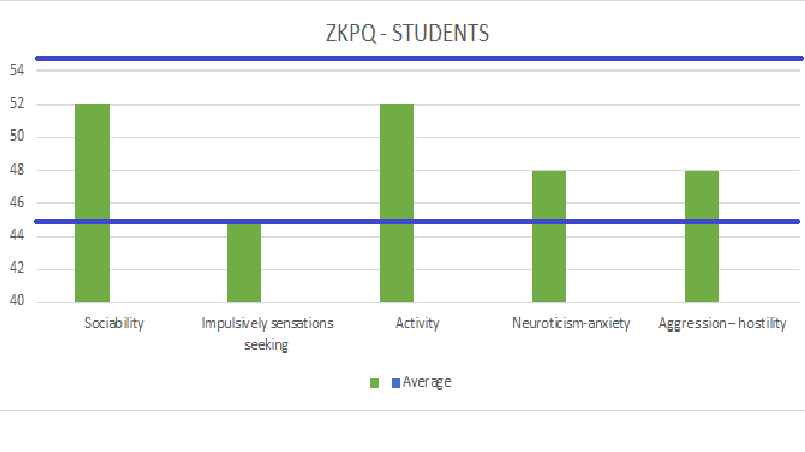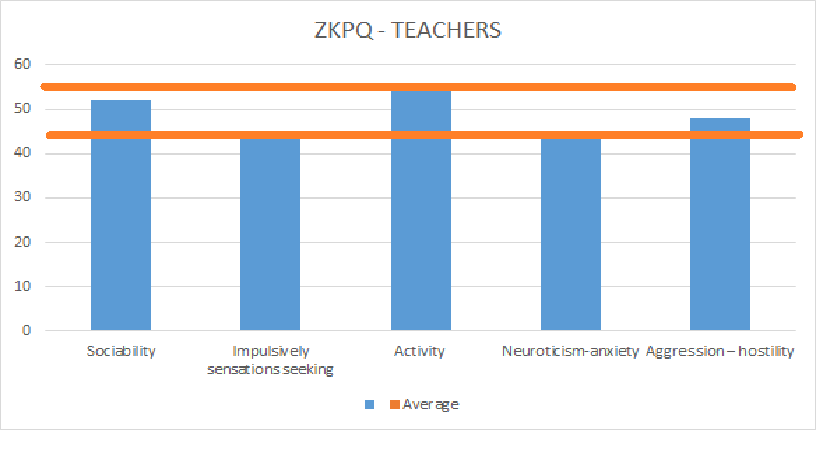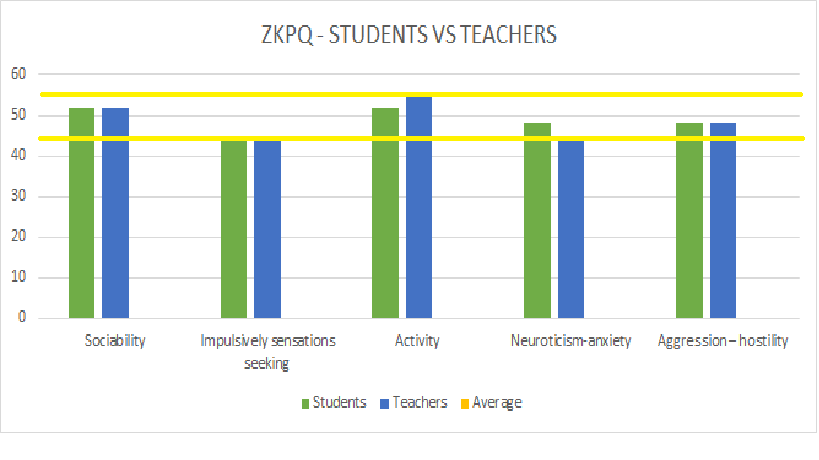Abstract
Drawing the portrait of a sports coach automatically involves the essential characteristics of their personality, the one that will be more or less noticeable in their future performance. In the context of current football, we believe that this characteristic with mental and behavioural ramifications, which is specific to future coach teachers, is of particular importance in the growth and formation of football players (sports side, human side). The purpose of identifying a model related to the synthetic-integrative component (which is personality) is to determine a series of indispensable elements directly involved in the process of training and competition: the level of sociability, aggression, the level of acknowledgement, planning, organization and implication in the sports activity. The model design relies on the Zuckerman-Kuhlman Personality Questionnaire (ZKPQ). The questionnaire was applied to UNEFS (National University of Physical Education and Sports) students with football specialisation (3rd year full-time students, part-time and Master students in the 1st and 2nd years of study) and to some coaches with noticeable performances in the junior football activity. The main characteristics of the model will be obtained by analysing a set of statistical data that will prove differences or similarities between current and future professionals in this field.
Keywords: Socially-evaluative situationsphysically dangerous situationsnew or ambiguous situations
Introduction
Personality is the field of interference of several scientific disciplines. It is possible to invent almost as many definitions of personality as psychological theories (e.g. the neo-behaviourist, psychodynamic, social ones). However, there is some consensus on a number of notions, which are generally included in any definition and description of personality: it has a conscious and unconscious part, is composed of elements of different origin, is a global concept and has a structure, a degree of permanence and its own dynamics (Gorgos, 1985).
We specify the definition given by one of the first psychologists to study personality, namely Allport (1961), who defines personality as the dynamic organization, within the individual, of those psychophysical systems that determine their characteristic behaviour and thought.
Analysing several definitions given to personality over time, some of its features can be (Dafinoiu, 2002):
Consistency – most theories postulate the idea of a certain organization and interdependence of the elements of personality.
Globality – personality consists of the set of characteristics that allow its description, its identification among other ones.
Temporal permanence (stability) – if personality is a functional system, it generates, by virtue of its coherence, organizational laws whose action is permanent. Although a person is transforming, developing, their mental identity remains. Human beings have the consciousness of their existence, the sense of continuity and personal identity, despite the changes that occur throughout their lives.
The personality factors (traits, structures, constructs) therefore have a relative stability, they are constantly manifested in behaviour, they cannot be radically altered by transient and accidental situations, but they are not completely rigid, they have some plasticity, they can restructure and refine under the pressure of environmental conditions.
The personality system has the following main features (Mitrache & Predoiu, 2016):
hypercomplex system – due to the large number of elements and complex links between them;
probabilistic system – because of the multitude of elements, the laws that act are probabilistic, the cause-effect relationship can only be determined in terms of probabilities (there is no definite connection between cause and response);
dynamic system – personality is formed and develops over time, passing through developmental stages from birth to senescence;
open system – develops only through the permanent communication (information exchange) with the environment;
the emergence – the personality’s characteristic of producing effects that cannot be reduced to the sum of its component traits and the connections between them, but results from their merging and interaction;
organization and hierarchical structure – personality is built on the principle of completeness of features and functions, which are systemically organized within its structures, so some features are cardinal, others are dominant, and many of them are subordinate features.
We complement the information provided with a personality definition given by Phares and Chaplin (1991), a definition that most psychologists would be willing to accept. So, personality is “that pattern of characteristic thoughts, feelings and behaviours that distinguishes one person from another and that persists over time and situation” (p. 4).
Problem Statement
The personality of the future football coach teacher contributes to the knowledge of the own players. This aspect can be solved individually or together with the technical staff, but, in any case, their personality mostly determines the highlighting of skills and abilities of the footballers involved in the training process.
The specific thought and behaviour of football coaches are fundamental features of personality, with major implications in creating optimal relationships within the sports group (coach - players, players - players, players - technical staff).
A realistic picture of the modern football coach can be highlighted on the basis of important personality traits such as: sociability, impulsiveness, dynamism, anxiety, aggression, hostility, in order to achieve performance.
Research Questions
In the context of research on the personality of future football coaches, the following issues are highlighted:
What are the personality characteristics of the future football specialist?
Are there differences between the personality of future graduates and that of specialists with experience in the field?
Can a personality model be obtained for the future football coach teacher?
In our opinion, the answers to these questions can generate certain characteristics specific to the personality of future specialists in the field.
Purpose of the Study
The purpose of the study is to outline, after analysing the data, an objective picture of the differences between the specialists and the future coach teachers involved in the research, so that the latter become aware of the personality issues and can get the expected results in their professional activity.
Research Methods
To conduct the research, we used the following methods: observation method, questionnaire method, mathematical and statistical processing and graphical method.
Subjects
The research subjects are 30 UNEFS students with football specialisation (3rd year full-time students, part-time and Master students in the 1st and 2nd years of study). Their responses to the questionnaire were compared to those of experts/teachers (30 subjects).
Instruments
To solve the research issues, we used the Zuckerman-Kuhlman Personality Questionnaire (ZKPQ) belonging to the Cognitrom Assessment System, a computer-assisted psychological assessment platform (designed by Cognitrom). The ZKPQ is intended to measure the five factors representing the dimensions of the Alternative Five-Factor Model (AFFM): Impulsive Sensation Seeking, Sociability, Neuroticism-Anxiety, Aggression-Hostility and Activity. The Impulsive Sensation Seeking Scale refers to the propensity to act quickly, instinctively, without thinking, and seeking excitement and agitation, to the preference for unpredictable situations and friends with unpredictable conduct, as well as to the need for change and novelty. The Neuroticism-Anxiety Scale joints items referring to emotional upset, worry, tension, difficulties in decision-making, lack of self-confidence and sensitivity to criticism. The Aggression-Hostility Scale describes the inclination to express verbal aggression and also provides information on the subjects with a quick temper and impatience in interpersonal relations. The Sociability Scale measures the pleasure the subject finds in interacting with others and having many friends, as opposed to the preference for solitary activities. The Activity Scale items measure the need to be always active, the impatience and inability to relax and do nothing, as well as the need to constantly make effort, the preference for a challenging, difficult work and the consumption of a high amount of energy in executing the tasks. Before interpreting the scores obtained by a subject on the ZKPQ Questionnaire scales, the subject’s score on the Social Desirability (Lie or Inconsistency) is analysed. Subjects obtaining high scores on this scale are generally those who want to make good impression to others and they are likely not to respond sincerely to the questionnaire items. The questionnaire was applied in October 2012, as an initial test, the comparison between different categories of subjects being required in order to determine the personality differences existing between them, due to their lifestyles. The observation and conversation (as research methods) supported this research, providing information on the condition of the subjects at that time, their willingness to make effort and be assessed, as well as their affective manifestations expressed under test conditions.
Procedure
The ZKPQ questionnaire w
Findings
Table
For a correct interpretation of the results, the gross scores were converted into T-shares, taking into account the age and gender of the research subjects.
In the case of the Social Desirability Scale, the scores obtained by the participants are not “high”, meaning that they have not distorted the responses to the questionnaire in an attempt to create a favourable self-image.

In the opinion of the students (from the evaluation of their responses), the personality, in terms of the analysed parameters, records an average score, except for Impulsive Sensation Seeking, with a positive trend for Sociability and Activity (Figure

Teachers’ responses highlight a mid-level value trend for the 5 parameters recorded in the personality area, with the exception of Impulsive Sensation Seeking and Neuroticism-Anxiety, where the values are close to the average (Figure

Comparative analysis of student and teacher responses highlights the same personality traits for 3 parameters: Sociability, Impulsive Sensation Seeking and Aggression-Hostility, and small differences for the following parameters: Activity, Neuroticism-Anxiety (Figure
Conclusion
Our research highlights some important features of the personality specific to future coach teachers and experienced teachers in our field of activity.
Relevant to their specific activity, the analysed parameters present sensitively close values that highlight the vocational qualities and traits of the profession of coach teacher with football specialisation.
Small differences were recorded between the two categories of subjects included in the research for two parameters, Activity and Neuroticism-Anxiety, as real as possible for our field of activity, where professional experience is of particular importance.
We believe that the personality traits highlighted in the study can be an indicative model for both the profession of football coach and those who wish to practice in this field of activity.
Acknowledgments
Authors’ contributions
All authors contributed equally to this paper and should be considered as main authors.
References
- Allport, G. W. (1961). Personality: A psychological interpretation. New York: Holt.
- Dafinoiu, I. (2002). Personalitatea, metode calitative de abordare. Observaţia şi interviul. Iași: Polirom.
- Gorgos, C. (Ed.) (1985). Vademecum în psihiatrie. Bucureşti: Editura Medicală.
- Mitrache, G., & Predoiu, R. (2016). Psihopedagogie – Curs în tehnologia IFR (Ediţie revizuită). Bucureşti: Discobolul.
- Phares, E. J., & Chaplin, W. F. (1991). Introduction to personality. Baltimore: Pearson.
Copyright information

This work is licensed under a Creative Commons Attribution-NonCommercial-NoDerivatives 4.0 International License.
About this article
Publication Date
16 February 2019
Article Doi
eBook ISBN
978-1-80296-054-9
Publisher
Future Academy
Volume
55
Print ISBN (optional)
-
Edition Number
1st Edition
Pages
1-752
Subjects
Sports, sport science, physical education
Cite this article as:
Ciolcă, S., Palade, T., Grigore, G., & Predoiu, R. (2019). The Model Regarding Personality Of The Future Coach With Football Specialisation. In V. Grigore, M. Stănescu, M. Stoicescu, & L. Popescu (Eds.), Education and Sports Science in the 21st Century, vol 55. European Proceedings of Social and Behavioural Sciences (pp. 171-177). Future Academy. https://doi.org/10.15405/epsbs.2019.02.21
